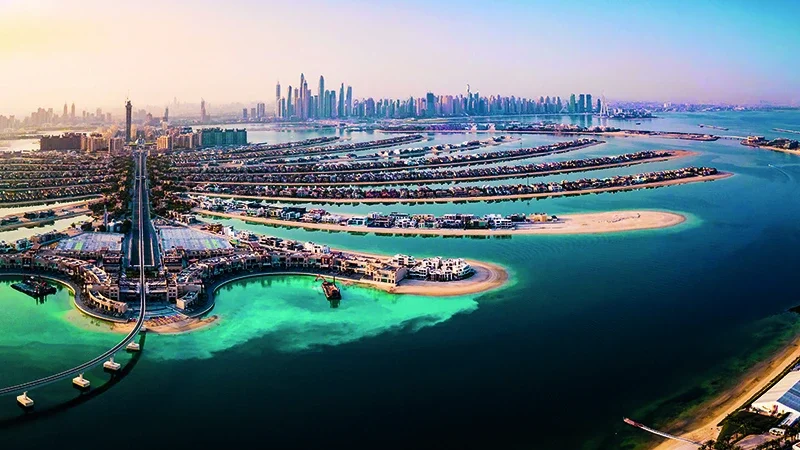
In September 2022, Judge Edward Hess issued a written judgment in the matter of a divorcing British husband and wife who for 14 years had been resident in Abu Dhabi in the UAE.
In SA v FA, which is regarded by leading lawyers as a critical development in determining where future cases may be heard, Hess rejected the wife’s request to have the divorce settled in London, even though he accepted that she was domiciled in England and Wales.
Instead, he decided that the divorce should be heard in the new Abu Dhabi Civil Family Court, set up in January 2022 for cases involving non-Muslims or Muslims from non-Muslim countries.
‘It seems to me that the new court has been set up with a view to giving assurance to non-Muslims living in the UAE that, if they do become divorced, they will be dealt with in a way which is commensurate with norms of non-Muslim countries,’ declared Hess. ‘I have no reason not to assume that any judge of the new court, whatever his faith, would deal with any case according to the statutory principles.’
At a stroke the judge had apparently cast doubt on what thousands of British expats in the UAE would have previously regarded as their right: to have their divorces heard in London if they so required.
[See more: What happens when a party in a divorce tries to conceal assets]
Advantages of conducting a divorce in the UAE
UAE-based solicitor Byron James, from Expatriate Law, acted on behalf of the wife in these proceedings and agrees that it sets a precedent – though not the one you might expect.
‘It means that even if you’ve lived in Abu Dhabi/Dubai for a long time and you have lots of connections to the UAE, you can still be found to be domiciled in England – that’s important,’ James tells Spear’s.
But it also shows that ‘unless there is a really good reason not to, the English court might consider appropriate for you to go to Abu Dhabi first for a financial outcome in your divorce before coming to the English court seeking a remedy’.

And that’s because if you are deemed domiciled in England and Wales, then you have the opportunity under part three of the Matrimonial and Family Proceedings Act of 1984 to ask the courts here to revisit financial relief after an overseas divorce.
In any event, the new Abu Dhabi court explicitly states that it won’t discriminate on gender or religion, meaning the judgments in ‘the newest family law jurisdiction in the world’ should be fair, according to James, who adds: ‘Judge Hess’s point, was, “Look, if it’s a bad outcome then you can always come back to England and have a remedy anyway because I’ve found you domiciled in England.” That was the safety net that allowed him to defer to the Abu Dhabi court.’
Disadvantages of conducting a divorce in the UAE
But, notes Madeleine Mendy, head of family law at Bin Sevan in Dubai, that’s expensive.
‘It’s fine if you are wealthy, but if you are a housewife, you will think twice about doing a part three application because it’s going to cost you a lot of money,’ she says. As a result, SA v FA has changed the advice she gives clients.
[See more: What are the largest ever divorce settlements in the UK]
‘I warn them that if your husband or spouse has an Abu Dhabi visa, our road to a fair settlement might take longer. [That’s] because, if Abu Dhabi takes a first bite of the cherry and we feel that there were other assets – so foreign-held assets that Abu Dhabi has no jurisdiction over and have not been taken into consideration – then you will have to go to England and get a second bite of the cherry.’
And, of course, the Abu Dhabi court is only relevant to those living, working or who were married in Abu Dhabi itself.
Family law in Dubai versus Abu Dhabi
The UAE has six other emirates. Dubai, the most popular with expats, this year introduced its own new divorce law for resident non-Muslims. This now means that across the entire UAE the assumption is that divorcing parents have 50:50 custody of children, whereas previously children would have stayed with their mother. And this, too, is leading to surprising results.

‘Now you have a wave of women that are converting to Islam to revert back to the original law that said they had automatic custody of their children and their husband has to pay 100 per cent for their kids, whether they’re working or not,’ says Mendy, who is aware of four or five such examples of expats who have decided that the Sharia-based law was better for them.
Moreover in Dubai – unlike Abu Dhabi – there is still no division of assets for splitting couples. This means that while the new UAE framework for non-Muslims allows for unlimited alimony, Dubai remains an attractive divorce destination to some because the new law does not get involved in division of assets, nor does it have extraterritorial powers.
This last limitation – applicable also to Abu Dhabi – means that for now, UHNWs and HNWs are unlikely to be able to resolve matters fully there.
When can you defer to UK courts?
‘High-net-worth individuals are unlikely to achieve final outcomes in UAE courts presently in circumstances where they own property outside of the UAE, where there are significant matrimonial property sharing claims to be made, [and] where there are issues like trusts, intervenors, [or] piercing the corporate veil,’ says Byron James. ‘Those more complex issues are more likely to be deferred to an English court.’
The solicitor advises couples moving overseas to have a pre-marital or a post-marital agreement in place. They’re useful ‘tactically, particularly for characterising assets as matrimonial or non-matrimonial, putting a ceiling on needs and even defining jurisdiction arguments’, says James, who adds that structuring is crucial.
[See also: Catherine Bedford: The family lawyer representing Middle Eastern royalty]
‘Owning a significant part of your assets outside of the UAE would be a very good reason for the divorce not to take place there. The UAE doesn’t have the power to make orders over foreign property and so on that basis alone that would be a very good reason for divorce to take place in a country that could make orders over those properties.’
For now, the new courts and laws mean that children cases are much more likely to ‘take place in Abu Dhabi and Dubai rather than being dealt with abroad’, says James.
When it comes to financial remedies, for run of the mill cases there’s ‘probably no problem’ in them being dealt with in Abu Dhabi civil family court. But for complex UHNW or HNW divorces it’s a different story, in which London is likely to continue to play a decisive role.
‘They’ll still be looking to countries like England to provide a conclusive outcome for the time being,’ says James. ‘But let’s see where we are in a bit of time.’






